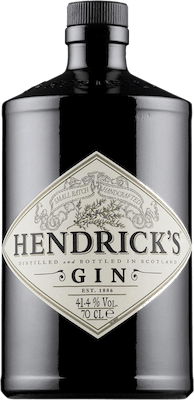Although it is the most commercial gin, as it can be found in all supermarkets, this gin, accompanied with the right tonic and a slice of cucumber that enhances its characteristics, is a guarantee! Round, delicate, with great balance and freshness. On the nose, it has floral notes of rose and elderflower, with hints of white pepper and anise.
Hendrick’s gin was born in Scotland, in the Ayrshire region, from a centuries-old expertise in the art of distillation. Its history, the anecdotes about its genesis and, above all, its unparalleled taste and olfactory characteristics have made it an icon of gin around the world. The Wall Street Journal has even called it the best gin in the world.
Hendrick’s gin has only been produced since 1999, but its history goes back much further. In 1966, Charles Gordon, patron of William Grant & Sons, bought two antique stills from his collection: the Carter-Head, handmade in 1948, and the Bennet Still, invented in 1860 by English distillers. After years of experimentation, using these two ancient stills, the master distiller at the Girvan Distillery, Lesley Gracie (a woman), perfected the perfect recipe.
The difference between the two stills is as follows: in the Carter-head, the cereal alcohol is mixed with water at 55 degrees and passes through a basket where the botanicals are, all except the cucumber and Bulgarian rose which are only added at the end. The botanicals in the basket are layered, first putting the larger grained ones and finally the finer ones, such as the angelica root which is in powder form. In the Bennet, on the other hand, the botanicals are left to steep. Only after mixing the products of the two stills, the cucumber and rose essences are added. Finally, the mixture is brought to 41.4° by adding water, so that it is more enjoyable and ready for your Gin & Tonic.
The recipe calls for the use of 11 botanicals: yarrow, coriander, juniper, chamomile, cumin seeds, cubebe berries, elderflower, orange peel, lemon peel, angelica root, and iris root. To these are added Bulgarian rose petals and German cucumbers, infused just before bottling.
Thus was born an intense and refreshing gin with great character and personality, best enjoyed in my opinion with Fever Tree Mediterranean tonic water and a slice of cucumber.

